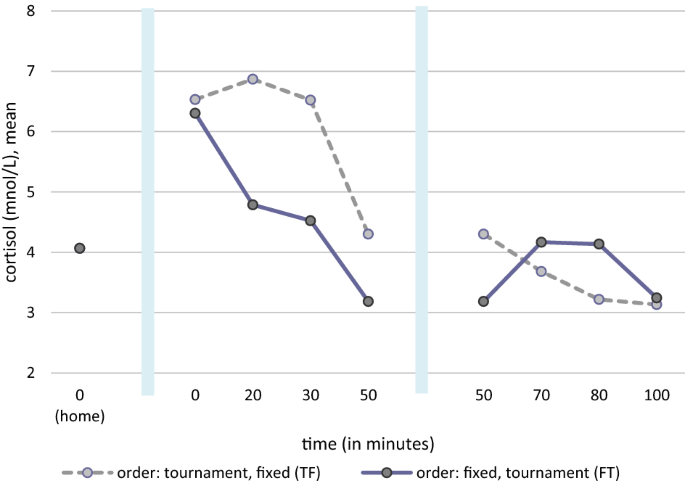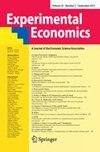Tournament incentives affect perceived stress and hormonal stress responses
IF 1.7
3区 经济学
Q2 ECONOMICS
引用次数: 1
Abstract
Abstract We conduct a laboratory experiment among male participants to investigate whether rewarding schemes that depend on work performance—in particular, tournament incentives—induce more stress than schemes that are independent of performance—fixed payment scheme. Stress is measured over the entire course of the experiment at both the hormonal and psychological level. Hormonal stress responses are captured by measuring salivary cortisol levels. Psychological stress responses are measured by self-reported feelings of stress and primary appraisals. We find that tournament incentives induce a stress response whereas a fixed payment does not induce stress. This stress response does not differ significantly across situations in which winners and losers of the tournament are publically announced and situations in which this information remains private. Biological and psychological stress measures are positively correlated, i.e. increased levels of cortisol are associated with stronger feelings of stress. Nevertheless, neither perceived psychological stress nor elevated cortisol levels in a previous tournament predict a subsequent choice between tournaments and fixed payment schemes, indicating that stress induced by incentives schemes is not a relevant criterion for sorting decisions in our experiment. Finally, we find that cortisol levels are severely elevated at the beginning of the experiment, suggesting that participants experience stress in anticipation of the experiment per se, potentially due to uncertainties associated with the unknown lab situation. We call this the novelty effect.

比赛激励影响感知压力和荷尔蒙压力反应
摘要:我们在男性参与者中进行了一项实验室实验,以调查依赖于工作绩效的奖励方案(特别是比赛奖励)是否比独立于绩效的固定薪酬方案更容易引起压力。在整个实验过程中,压力在荷尔蒙和心理水平上都被测量出来。通过测量唾液皮质醇水平来捕捉荷尔蒙应激反应。心理应激反应是通过自我报告的压力感受和初步评价来衡量的。我们发现比赛激励会引起压力反应,而固定支付不会引起压力。这种压力反应在公开宣布比赛胜负的情况和保密的情况下没有显著差异。生物和心理压力测量呈正相关,即皮质醇水平的增加与更强烈的压力感有关。然而,在之前的比赛中感知到的心理压力和升高的皮质醇水平都不能预测随后在比赛和固定支付方案之间的选择,这表明激励方案引起的压力不是我们实验中排序决策的相关标准。最后,我们发现皮质醇水平在实验开始时严重升高,这表明参与者在对实验本身的预期中经历了压力,这可能是由于与未知实验室情况相关的不确定性。我们称之为新奇效应。
本文章由计算机程序翻译,如有差异,请以英文原文为准。
求助全文
约1分钟内获得全文
求助全文
来源期刊

Experimental Economics
ECONOMICS-
CiteScore
4.10
自引率
8.70%
发文量
40
期刊介绍:
Experimental methods are uniquely suited to the study of many phenomena that have been difficult to observe directly in naturally occurring economic contexts. For example, the ability to induce preferences and control information structures makes it possible to isolate the effects of alternate economic structures, policies, and market institutions.Experimental Economics is an international journal that serves the growing group of economists around the world who use experimental methods. The journal invites high-quality papers in any area of experimental research in economics and related fields (i.e. accounting, finance, political science, and the psychology of decision making). State-of-the-art theoretical work and econometric work that is motivated by experimental data is also encouraged. The journal will also consider articles with a primary focus on methodology or replication of controversial findings. We welcome experiments conducted in either the laboratory or in the field. The relevant data can be decisions or non-choice data such as physiological measurements. However, we only consider studies that do not employ deception of participants and in which participants are incentivized. Experimental Economics is structured to promote experimental economics by bringing together innovative research that meets professional standards of experimental method, but without editorial bias towards specific orientations. All papers will be reviewed through the standard, anonymous-referee procedure and all accepted manuscripts will be subject to the approval of two editors. Authors must submit the instructions that participants in their study received at the time of submission of their manuscript. Authors are expected to submit separate data appendices which will be attached to the journal''s web page upon publication. Officially cited as: Exp Econ
 求助内容:
求助内容: 应助结果提醒方式:
应助结果提醒方式:


